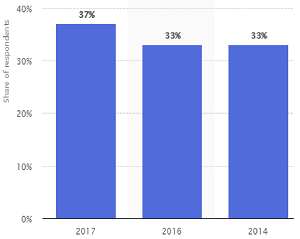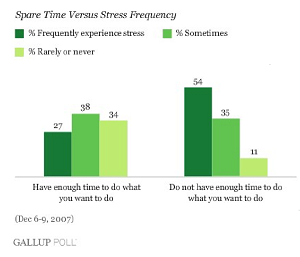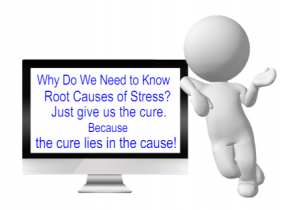
Stressed? Get to the Root Cause!
You feel stressed?
You’re not alone! According to a recent Gallup poll, 79% of Americans are afflicted by stress (Dec. 20, 2017). The root causes of stress affect us all.
Moreover, many adults believe their stress levels are rising over time.

Graph: Percentage of adults who stated their stress level had increased over the previous year in the U.S. when surveyed each year from 2014 to 2017. Source
The graph shows that, in 2017, almost 37% of adults said their stress levels increased over already high levels in previous years. Increases in 2020 span age groups from teens through adulthood. Source
Worldwide pandemic and economic pressures parallel the most recent increases in stress levels. However, the causes of stress run wider and deeper than any current wave of external provocations.
Take heed: You’re about to learn the root causes of stress. Why bother? Because understanding true causes opens the way for customizing your cure. You will always deal more effectively with life when you understand and master stress.
What You Will Learn in This Blog Post:
• Why are so many people stressed?
• Is this the natural way to be?
• Was it always this way?
• Why is contemporary society defined by ever-rising levels of the dilemma of stress?
To find out how we got this way,
let’s take a quick trip through time.
Then and Now
Back in the sixties and seventies . . .
The new frontier generation envisioned a future that promised hours of leisure. New technology would automate our lives and streamline tiresome tasks.
 No more clunky typewriters, telephones, or manual vacuum cleaners. High tech inventions that would make life easier and less stressful. Less labor would mean more time on our hands.
No more clunky typewriters, telephones, or manual vacuum cleaners. High tech inventions that would make life easier and less stressful. Less labor would mean more time on our hands.
President John F. Kennedy foresaw the booming needs of an increasingly relaxed and leisure society. He began planning urban development with the requisite inclusion of pastime accommodations: more parks, open spaces, and areas for recreation.
It was as if technology was going to remove the root causes of stress in our lives.
Fast forward to . . .

. . . the era of push-button global communication and artificial intelligence.
Massive TV screens can connect to the Internet in a flash and deliver movies on demand.
Not to mention headsets that can virtually transport you into outer space.
Technology has accelerated at such a rate that our present generation has experienced more advancements than all previous decades combined.
Thanks to globalized trade and endless technological innovations, we can now be connected 24/7 Internet. We can even sit back and get our information from pocket-sized talking robots, whether at home, in the workplace, or even on the beach — “Hey, Alexa. When is it going to start raining?”
Did you know:
 “The smartphone in your hand is millions of times more powerful than all of NASA’s combined computing in 1969.” Your laptop or PC performs calculations at least 1,000,000 times faster, and an iPhone 120,000,000 times faster, than the Apollo spacecraft that landed men on the moon! (Source )
“The smartphone in your hand is millions of times more powerful than all of NASA’s combined computing in 1969.” Your laptop or PC performs calculations at least 1,000,000 times faster, and an iPhone 120,000,000 times faster, than the Apollo spacecraft that landed men on the moon! (Source )
Soon we’ll be chauffeured by self-driving cars. Will that be less stressful? We’ll see.
The dream is here and now. We are literally living the dream.
The big question now is . . .
Why are we still stressed? Or more importantly: why are we even more stressed than our predecessors?
Technology was supposed to remove the root causes of stress. Did Technology become a new root cause of stress?
Sociologists, psychologists, and even economists have tried to pinpoint the origin of stress in historic time. As if to identify a juncture at which humans started to become a stress-laden race.
The quest to discover the root causes of stress in the modern-day is complex. However, common threads prevail. They can help us understand ourselves and thereby enable us to transform ourselves into less stressed beings.
Our goal in this blog is to help you move from feeling stressed to relieving and even eliminating stress. It is possible!
What Are the Root Causes of Stress?
Root Cause #1: Speed
Notice in our Fast-forward section above that the elements of “the dream” share a common theme: Speed.
Every internet provider and every generation of tech advances boasts of faster communications.
The 24/7 warp speed internet convenience translates to the always-on 21st-century workplace. You can tap world data sources for research and reports any time of the day or night. By George, you can even buy insurance in the middle of the night. Is “Jake at State Farm” still there? (ha-ha)
In our daily experience, this momentum of faster communication translates to an endless desire for speed, pushing the envelope incrementally more, and pushing the envelope of our brains and bodies ever more.
It’s as if time and space are being squeezed at a progressive pace, faster than our minds and bodies can handle. That’s the feeling is stress.
Root Cause #2: Less Leisure Time, Not More
Contrary to President Kennedy’s prediction that we noted, the conveniences of automation have not created a leisurely society. They have just shifted around our schedules.
Many people often associate stress with the demands on their time to balance work with household duties.
Surprise: The amount of this time requirement has not changed much for nearly 120 years!
Studies compared the time people spend taking care of their homes and families today with the time spent doing the same things back in the early 1900’s. Result: We spend the same average time: 52 hours per week. (National Bureau of Economic Research)
The reason the time allotment is the same is this: Today we’re spending more time on additional activities, such as grocery shopping. People tend to view these as chores, not leisure.
So, despite the plethora of high tech conveniences that are quickening our time to complete tasks, we still are not enjoying the leftover hours as leisure time. Additional, unavoidable activities are still consuming that luxury.
And there goes our sought-after leisure time to rest, recoup and de-stress.
Root Cause #3: Stressors Everywhere
Ideally, a person stressed at work comes home to unwind and de-stress.
Congratulations to those who achieve this!
However, 54% of adult Americans do not enjoy this equilibrium (Gallup).
According to the American Psychological Association, adults are more likely to find family responsibilities more stressful than they have in the past. Their survey reveals that, after money and work, family responsibilities comprise the most common stressor.
The 2017 Gallup poll confirms that Americans’ biggest stressors are children and work.

So, the present reality is that an ordinary working adult no longer experiences a reprieve from stress.
He runs on a high-adrenaline wheel of work/home/work, and round and round, or so it seems.
Root Cause #4: Societal Pressures
Issues around gender distinction and equality pervade contemporary society. They especially play out in the workplace and they are getting more complicated.
Perceptions and practices of double standards and ambiguous boundaries stir up uneasiness among co-workers.

One area, for example, regards male/female status. After decades of the evolving workplace, there still can linger resentment of ambitious, independent women.
On the other hand, the absence of the same traits in a man can typecast him as a poor competitor and bad risk for employment.
The underlying stress erupts when these attitudes reward male aggressive competition but not female drive and initiative.
Double standards are toxic in the workplace. Yet, overall, they are slow to fade away. This alone can make the workplace an extremely frustrating and stressful environment for both males and females.
Root Cause #5: Chronic Overwork
Most adult working Americans complain of not having enough time in a day to complete their planned activities.
Stress goes hand in hand with the lack of time, as this Gallup poll indicates.
The Gallup poll graph shows that 54% of the Americans who report frequently experiencing stress also feel they do not have enough time to do what they want to do.
To compensate for the scarcity of time, many adults resort to overworking.
Warning: There are consequences! Continual overwork usually leads to a “burn out” phase.
If an overworked person does not actively take measures to reduce stress levels both at work and at home, then burn out recovery can be very difficult and result in problems that are more serious.
Root Cause #6: Family Fragmentation
While less than earlier decades, the divorce rate in America is still a staggering 39%. Source
This means that a significant percentage of the entire American population is comprised of single-parent families with one main earner.
This reality forces many single parents to work two or three times as hard just to keep up with the daily expenses of their families.
Obviously, this situation is extremely stressful. Leisure time and personal time are almost nonexistent. Any other free time from work gets diverted to caring for children and household.
The Takeaway:
The root causes of stress in contemporary society parallel technological changes over the past several decades. The acceleration of high-tech changes over the past decades has strived to create an increasingly leisurely, stress-free society. However, the living dream of time-saving conveniences has had the reverse effect.
Most of us humans tend to be gluttons for space and time. The more we have, the more we tend to fill it up with “necessities”. Then we want or need even more. Are we ever really satisfied? Meanwhile, self-imposed pressures for more things bring on more stress.
Try to do an introspective search for your personal root causes of stress. Therein lies a link to your cure.
In our Stress Buffer Blog, we reveal self-directed ways that you can explore and discover your personal pathways, along with tips and tricks to relieve and even eliminate stress from your life.
Now Ask Yourself
If you were given the gift of time – let’s say three days of more free time, how would you use it?
Please leave your thoughts below in the Comment box.
By the way, have you accessed your

10 Stress Habits and Alternatives!
If not, click here


amazing
My spouse and I stumbled over here different website and thought I might check things out.
I like what I see so i am just following you. Look forward to finding out about your
web page again.
Thanks designed for sharing such a pleasant thinking, piece of writing is pleasant, thats why i have read it completely|
I really liked your blog article.Thanks Again.
Might be practically unattainable to come across well-aware viewers on this area, regrettably you look like you realize what you’re raving about! Appreciation
The next time I read a blog, I hope that it won’t fail me as much as this one. After all, Yes, it was my choice to read through, nonetheless I really believed you’d have something interesting to say. All I hear is a bunch of complaining about something that you could fix if you were not too busy looking for attention.
You’re so awesome! I don’t believe I have read a single thing like this before. So nice to find somebody with some unique thoughts on this subject. Really.. thanks for starting this up. This site is something that is needed on the web, someone with a bit of originality!
informative
It’s nearly unattainable to see well-educated women and men on this theme, nevertheless you appear like you know which you’re revealing! Cheers